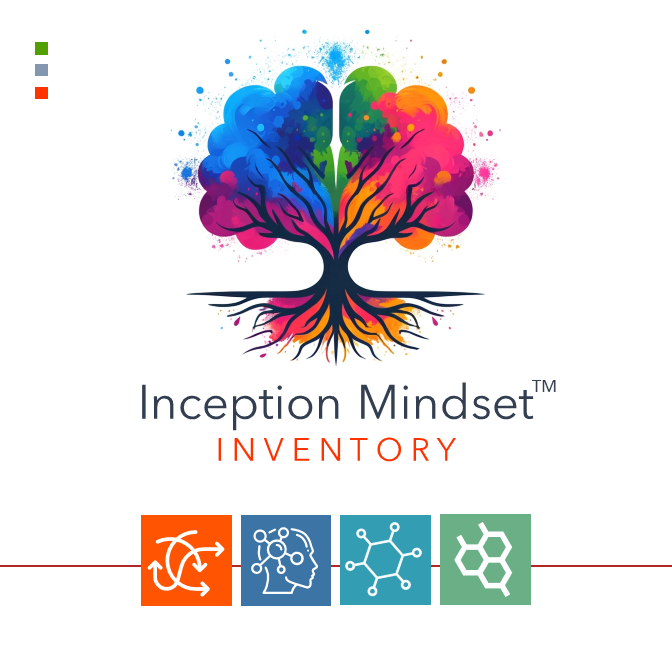
WINTER 2025 Vol.2 | By Dr. Robert Radi
Award-winning author and innovation strategist. President and Partner at Integral Advantage®, an IACET-accredited organization committed to cultivating leadership and strategic organizational capacity across private and public sector entities. You can follow him on LinkedIn.
You Can Listen to the Article
Editor Note: This revised article was originally published in Spring 2023, and an excerpt was included in Chapter 3 of the book Inception Mindset: The Contextual Art and Science of Leading in a Permanently Complex World.
Introduction
The expression “Fake it until you make it” has been a recurring figure of speech in self-help and motivational circles for many years. Often, it is used as a tongue-in-cheek expression when someone expresses doubt about their competency. The expression’s origin usually depends on who you ask.
Some argue that Simon & Garfunkel’s “Fakin’ It,” released in 1968, is what started it all: “And I know I’m fakin’ it, I’m not really makin’ it.” Whatever the origin, substantive leadership implications exist as the expression promotes inauthenticity and adversely affects individuals and those around them. We have seen many instances where executives have taken “Fakin’ It” literally and a few steps too far with disastrous consequences for organizations, the community, and society.
Uhmmm…Make Me Care
The mindset that we can replace acquiring competency through mindful learning with a “winging our way to competency” mentality encourages individuals to present a false image of themselves in the context in which they operate. Rather than embracing their true selves and working to improve their weaknesses by leveraging their strengths, they are misguided in pretending they already have the desired qualities.
This attitude often triggers the Dunning-Kruger effect, a cognitive bias where people with low abilities in a particular domain overestimate their performance and skills. This effect can occur because individuals with limited skills and knowledge cannot often recognize their shortcomings, leading to an inflated sense of self-confidence. The Dunning-Kruger effect has important implications for personal and professional development, highlighting the need for self-awareness and a growth mindset.
Why is the “Fake it until ” mindset a critical issue? In a time when authenticity is vital to leaders operating in complexity, inauthenticity can be detrimental to an individual’s sense of self-worth. When people pretend to be something they’re not, it can also be challenging to maintain this façade, leading to anxiety and stress. Another problem with the “Fake it until” mindset is that it can lead to a lack of growth and development.
But…It Is Not Impacting Anyone Else
Not so fast. When individuals focus on pretending to have qualities rather than working to develop them, they miss out on the opportunity to learn and grow. By concentrating on appearing confident and capable, individuals may miss the chance to develop the core competencies they need to succeed in their careers, which can adversely affect those around them. When individuals present a false image of themselves, they can deceive others and create false expectations.
To use the words of Santiago Ramón y Cajal, the renowned father of neuroscience, I am arguing that they are “sculpting” such mindset in their brains, leading to disappointment, mistrust, and damaging relationships. Furthermore, when those in executive positions pretend to be something they’re not, they can create a toxic work environment where everyone is trying to present a false image, leading to feelings of anxiety and competition. Literally, they model the way, and not in a constructive fashion.
I Don’t Know What I Don’t Know…Tell Me More
While curiosity may “kill the cat,” it is essential in learning and developing leadership competencies. Authentically engaging with our dynamic environment and the people who operate in our context is critical in entering a space of meaning-making when seeking clarity in complexity. This mindset recognizes that success and growth come from embracing our
authentic selves and working to improve our weaknesses by leveraging our strengths and enrolling the help of others. Being vulnerable and openly acknowledging our challenges creates a sense of authenticity and builds trust with others. Furthermore, engaging in activities that align with our values and character strengths makes us more likely to experience fulfillment.
This mindset also promotes growth and development by encouraging individuals to focus on building their core competencies. Rather than pretending to have qualities they don’t possess, individuals are encouraged to identify their weaknesses and work to improve them, leading to a deeper understanding of oneself and can help individuals build the skills and expertise they need to succeed in their careers and life. Authentically engaging allows us to express our genuine curiosity toward other individuals’ experiences, skills, knowledge, and perspectives. Socrates celebrated his limited knowledge by depicting his learning as a white dot on a large black slate.
We Need to Authentically Engage with Others
When was the last time we nodded our heads when something was said in a meeting, and we didn’t know what it meant but felt we needed to show we knew? An acronym, a financial or technical figure, or a place? Yes, perhaps it wasn’t a big deal, and we “googled” it later, but at that moment, we denied our curiosity and the opportunity for the other party to share their expertise. By being vulnerable and engaging in activities aligned with our values and character strengths, we are more likely to experience happiness, success, and fulfillment. Brené Brown, a renowned researcher and speaker on vulnerability, courage, and shame, defines vulnerability as “uncertainty, risk, and emotional exposure.” According to Brown, vulnerability is the cornerstone of authentic relationships, allowing individuals to connect with others on a deeper, more meaningful level.
When individuals are willing to share their concerns, insecurities, and emotions with others, they build trust and create a sense of belonging. Furthermore, when individuals feel they can be their authentic selves with others, they experience a greater understanding of self-acceptance and self-worth.
So What; Now What? Enters Neuroplasticity
Authentic Engagement is the mindset we ought to adopt to “sculpt” our brains, as suggested by Santiago Ramón y Cajal (1852–1934), who observed before the advent of MRI and CAT Scans the ability of the brain to generate new neuro patterns because of nontraumatic events. Neuroplasticity is the brain’s ability to adapt and change in response to new experiences, learning, and development. It is a critical component of leadership and character development, allowing individuals to develop new skills and behaviors, overcome limitations, and grow in various ways. Neuroplasticity refers to the brain’s ability to reorganize itself in response to new experiences. It plays a critical role in enabling individuals to learn and develop new competencies. For leaders who authentically engage with others to learn and grow, neuroplasticity can facilitate acquiring and refining new skills and developing more effective communication and collaboration strategies.
Neuroplasticity facilitates leadership development by strengthening neural connections that underpin social interactions. When leaders engage with others, they are exposed to various experiences and perspectives that challenge their assumptions and expand their understanding of the world. This exposure can lead to the development of new neural connections, which can help leaders communicate more effectively, collaborate more productively, and build more resilient relationships. I often tell the participants in my workshops and seminars that all development is incremental and neuroplasticity facilitates leadership development through deliberate practice. This approach involves breaking down complex skills into smaller, more manageable components and then practicing those components systematically over time.
Final Remarks
By engaging in deliberate practice, leaders can strengthen the neural connections associated with specific competencies, such as active listening, strategic thinking, and emotional intelligence. Over time, these strengthened neural connections can develop more efficient and effective brain circuits that support the targeted competencies.
Lastly, neuroplasticity facilitates leadership development by cultivating a growth mindset. This mindset involves embracing challenges, persisting in the face of setbacks, and seeking feedback and learning opportunities. By adopting a growth mindset, leaders can foster the neural plasticity necessary to develop new competencies and overcome limitations that may have previously held them back.
Neuroplasticity provides a powerful mechanism for leaders who authentically engage with others to learn and develop competencies. By building new neural connections, engaging in deliberate practice, and cultivating a growth mindset, leaders can strengthen their social, cognitive, and emotional capabilities and become more effective and resilient.
2023, 2025 © Integral Advantage®
END OF ARTICLE
We trust you enjoyed this thought-provoking article. Subscribe below to be notified of future articles. Please feel free to share it on your favorite social media platforms.
For more articles like this, click here to visit the article section. Thank you!
Have you taken the Inception Mindset™ Inventory by Integral Advantage®?
This exclusive professional development tool is a self-assessment designed to catalyze personal and professional growth—and we’re offering it complimentary! CLICK HERE.
Completing the assessment involves addressing 24 items on a 5-point Likert scale. Your personalized report will be emailed (please check spam folder) to you and will also be available for instant download, providing immediate insights into your developmental journey.
Embarking on a journey of personal and professional development often prompts us to ponder, “Where am I right now?” This introspection is akin to navigating a sprawling shopping mall in search of a specific store. When we encounter a map, the ‘You Are Here’ marker, though it doesn’t lead us directly to our destination, provides essential guidance.
Similarly, the Inception Mindset™ Inventory acts as a navigational aid in the vast landscape of self-improvement. It doesn’t define who we are but illuminates our current position, empowering us to chart a path toward our aspirational selves.
With an Inception Mindset™, we equip ourselves to navigate the unprecedented complexity of our times more effectively.
Bibliography
Brown, B. (2010). The Gifts of Imperfection: Let Go of Who You Think You’re Supposed to Be and Embrace Who You Are. Hazelden Publishing.
Brown, B. (2012). Daring Greatly: How the Courage to Be Vulnerable Transforms the Way We Live, Love, Parent, and Lead. Gotham Books.
Dunning, D., Johnson, K., Ehrlinger, J., & Kruger, J. (2003). Why people fail to recognize their own incompetence. Current Directions in Psychological Science, 12(3), 83-87.
Dweck, C. S. (2017). Mindset: Changing the way you think to fulfill your potential. Robinson.
Goleman, D. (1995). Emotional intelligence: Why it can matter more than IQ. Bantam Books.
Kolb, B., & Whishaw, I. Q. (2015). Fundamentals of human neuropsychology. Worth Publishers.
Kruger, J., & Dunning, D. (1999). Unskilled and unaware of it: How difficulties in recognizing one’s own incompetence lead to inflated self-assessments. Journal of Personality and Social Psychology, 77(6), 1121-1134.



